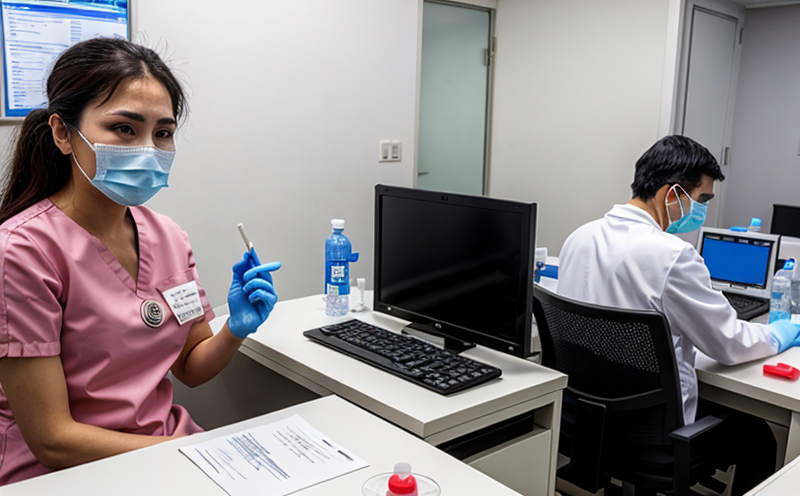Canine Parvovirus Antibody Titer Testing
The canine parvovirus antibody titer test is a critical diagnostic tool used to assess the presence and level of antibodies against canine parvovirus in a dog's serum. This serological test provides valuable insights into a dog’s immune response, which can inform vaccination protocols, monitor disease exposure, and guide treatment decisions.
This test is particularly important for dogs that have recently been vaccinated or those who are unvaccinated but require protection from the virus. The titer level indicates how well-protected the animal is against parvovirus infection. A high titer suggests strong antibody levels, which provide a higher degree of immunity. Conversely, low titers may indicate insufficient vaccination coverage or waning immunity.
The canine parvovirus (CPV) belongs to the Parvoviridae family and is highly contagious among canines. It primarily affects puppies but can also affect adult dogs if they are not adequately vaccinated. CPV causes severe gastrointestinal illness, leading to symptoms such as vomiting, diarrhea, dehydration, and in some cases, death.
The test involves the use of a sample of blood (serum) drawn from the dog. The serum is then tested using an immunoassay method that measures the concentration of antibodies specific to CPV. This quantitative measurement helps healthcare professionals understand the efficacy of past vaccinations and assess the risk of infection.
Understanding titer levels is essential for several reasons:
- To determine if a dog has developed adequate immunity after vaccination.
- To monitor the effectiveness of vaccine protocols in kennels or shelters where multiple dogs are housed together.
- To help diagnose CPV infection, particularly when clinical signs are present but the presence of antibodies is uncertain.
The test results can be used to adjust vaccination schedules for individual animals, thereby optimizing the use of vaccines and reducing unnecessary exposure to potential side effects. Additionally, it helps in identifying dogs that may need additional protective measures or further evaluation by a veterinarian.
Why It Matters
The importance of canine parvovirus antibody titer testing cannot be overstated, especially in the context of clinical and healthcare practices. Accurate measurement of CPV antibodies is crucial for:
- Preventive Healthcare: Ensuring that dogs are adequately protected against a potentially lethal virus.
- Risk Assessment: Identifying individuals at high risk of infection due to low titers or lack of previous vaccination.
- Veterinary Decision-Making: Providing data-driven insights into the effectiveness of past vaccinations and guiding treatment decisions during outbreaks.
Moreover, this test is a key component in ensuring compliance with regulatory standards set by organizations like the American Animal Hospital Association (AAHA) and the World Health Organization (WHO), which recommend routine serological testing for high-risk populations. The information derived from these tests helps veterinarians tailor their care to individual animals, improving overall pet health outcomes.
By using this test, healthcare providers can make informed decisions about the necessity of additional vaccinations or other preventive measures, ultimately contributing to a healthier population of dogs and reducing the spread of CPV in communities.
Scope and Methodology
| Step | Description |
|---|---|
| Sample Collection: | A sample of blood (serum) is collected from the dog. Proper collection and handling are crucial to ensure accurate results. |
| Antibody Detection: | The serum is tested using an immunoassay method that specifically targets CPV antibodies. This involves incubating the sample with a known antigen, followed by a detection step to quantify the antibody present. |
| Interpretation: | The results are interpreted based on predetermined cut-off values that define what is considered a positive or negative titer. These values may vary depending on the test and the laboratory performing the analysis. |
The methodology employed ensures consistency with international standards, such as ISO 15189 for quality management systems in laboratories. This standardized approach guarantees accurate and reliable results that are widely accepted within the veterinary community.
It is important to note that while this test provides valuable information about a dog's immunity status, it should be used in conjunction with other diagnostic tools and clinical evaluations. The test does not diagnose active infection but rather indicates past exposure or current vaccination efficacy.
International Acceptance and Recognition
- American Animal Hospital Association (AAHA): Guidelines recommend the use of serological testing to assess immunity in high-risk populations, including puppies and dogs with a history of poor vaccination response.
- World Health Organization (WHO): The WHO acknowledges the role of serology in monitoring disease exposure and guiding public health policies.
The results from canine parvovirus antibody titer testing are widely accepted by regulatory bodies, veterinarians, and pet owners worldwide. Compliance with international standards ensures that the test results are valid and comparable across different regions. This makes the test a reliable tool for both local and global health initiatives.





